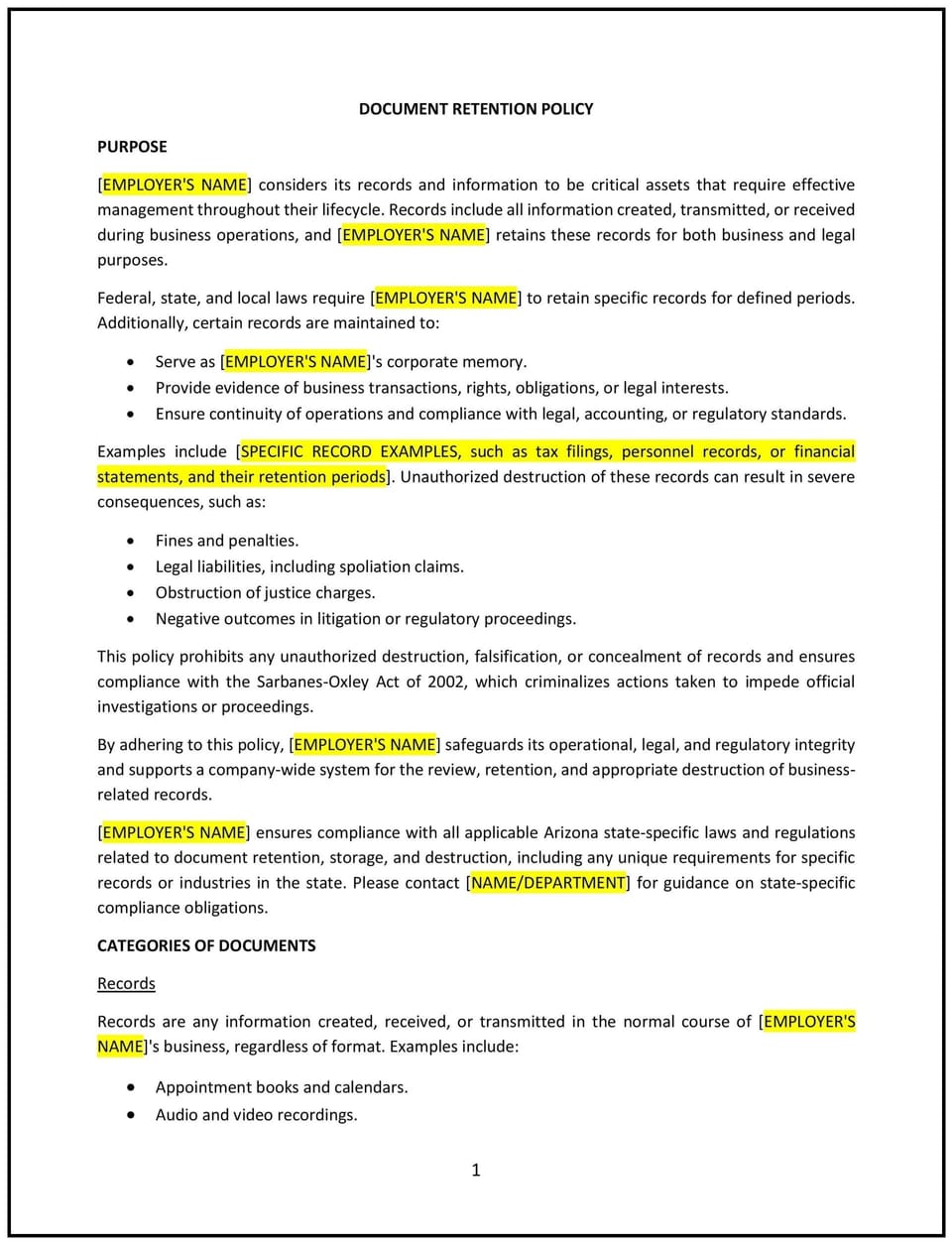Document retention policy (Arizona): Free template

Document retention policy (Arizona)
In Arizona, a document retention policy provides businesses with guidelines for managing, storing, and disposing of records to meet legal, regulatory, and operational requirements. This policy helps ensure compliance, protects sensitive information, and supports efficient document management practices.
This policy outlines retention periods for various types of documents, procedures for secure storage, and guidelines for proper disposal. By implementing this policy, Arizona businesses can streamline operations, reduce risks, and maintain accountability.
How to use this document retention policy (Arizona)
- Define retention periods: Specify how long different types of records must be retained based on legal, regulatory, and business needs. Examples include tax documents, contracts, and employee records.
- Establish storage guidelines: Outline procedures for securely storing physical and digital records, ensuring accessibility and protection against unauthorized access.
- Include disposal processes: Provide clear steps for securely disposing of records once the retention period has expired, such as shredding or secure digital deletion.
- Assign responsibilities: Designate roles for managing document retention and overseeing compliance with the policy.
- Monitor and update: Regularly review and update retention schedules to reflect changes in Arizona laws or business operations.
Benefits of using a document retention policy (Arizona)
This policy offers key benefits for Arizona businesses:
- Supports compliance: Helps meet Arizona-specific and federal recordkeeping requirements, reducing the risk of penalties.
- Protects sensitive information: Ensures secure handling and disposal of confidential records to prevent unauthorized access or data breaches.
- Improves efficiency: Streamlines document management, reducing storage costs and improving access to critical information.
- Reduces legal risks: Maintains clear records that can be used to defend the business in audits, disputes, or litigation.
- Enhances accountability: Establishes clear guidelines and responsibilities for recordkeeping within the organization.
Tips for using a document retention policy (Arizona)
- Address Arizona-specific regulations: Include retention requirements for industries like healthcare or finance, where state laws may have additional mandates.
- Use technology: Implement digital solutions for tracking and managing document retention schedules, ensuring accuracy and efficiency.
- Train employees: Educate staff on the importance of following retention schedules and secure handling of sensitive records.
- Conduct audits: Periodically review compliance with the policy to ensure records are being managed and disposed of appropriately.
- Include disaster recovery: Incorporate procedures for safeguarding records during emergencies, such as fires or floods, especially for physical documents.
Q: What types of documents should be retained under this policy?
A: Examples include tax records, employment agreements, contracts, financial statements, and legal documents, depending on their relevance to the business and legal requirements.
Q: How long should tax documents be retained in Arizona?
A: Typically, tax records should be retained for at least seven years, though specific timeframes may vary depending on the type of tax and applicable laws.
Q: What are the best practices for disposing of records?
A: Use secure methods such as shredding for physical records and certified data wiping for digital records to prevent unauthorized access.
Q: How can businesses ensure compliance with this policy?
A: Assign responsibility for recordkeeping to a specific team or individual, provide training, and conduct regular audits to monitor adherence.
Q: How does this policy support compliance with Arizona laws?
A: It aligns with state-specific and federal recordkeeping requirements, ensuring proper retention and secure disposal of business records.
This article contains general legal information and does not contain legal advice. Cobrief is not a law firm or a substitute for an attorney or law firm. The law is complex and changes often. For legal advice, please ask a lawyer.


